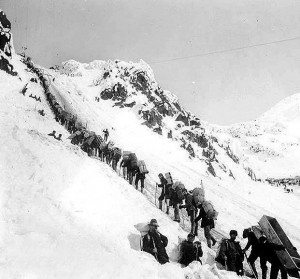There are ALWAYS business opportunities
 Business opportunities always exist. During the depths of the great depression, there were entrepreneurs who saw great opportunity and in fact, became wealthy.
Business opportunities always exist. During the depths of the great depression, there were entrepreneurs who saw great opportunity and in fact, became wealthy.
The trick is to look at the environment from a different angle. I heard a speech by famed quarterback Peyton Manning who said his job was to scan the field and see things that others don’t. Things such as where the safeties are lined up, and call an audible when prudent.
As a business leader, that’s your job as well.
Think all opportunities are gone? Read these quotes from the past:
- “Everything that can be invented has been invented.” Charles Duell, US Patent Office, 1899
- “The horse is here today, but the automobile is only a novelty-a fad” President of Michigan bank advising against investment in Ford.
- “What use could this company make of an electric toy?” Western Union turning down rights to the telephone.
When I was in the US Coast Guard, I had a chief electronic technician tell me, “This solid state stuff is not here to stay. Concentrate on tubes”
Do you get the pattern? Many, if not most, people fail to see trends and the opportunities they present. J. Paul Getty put his inheritance at great risk by buying depressed oil stocks when everyone else was dumping them. When the great depression ended and oil prices rose, he became a billionaire.
It’s not always true of course, that going the opposite direction of everyone else is a winner. But, in most cases, that is what winners do. The trick is to spot opportunities others are running away from.
Many business people fall into the trap of nostalgically longing for past times. “Things were great in the 90’s.” Well, the nineties are gone, and we live in what is the new normal. If you’re going to be successful, you must do it in the environment of now, not the past.
Change simply for change’s sake is a disaster. But, not adapting to a changing business environment is suicide.
Former GE Chairman Jack Welch said, “I am convinced that if the rate of change inside an organization is less than the rate of change outside, the end is in sight.”
For almost all businesses, whether you will change isn’t the question. You almost certainly will. But, will it be a healthy controlled change, or will it be a very unhealthy change forced on you by the market?
Businesses today face a rate of market change that is probably unparalleled. When I started my career, almost no one owned a computer. Now, about 85% percent of American households own at least one. The internet has grown even more rapidly, transforming almost all of modern life.
Not all changes are positive, in fact, many are frighteningly negative. But, the smart business person, like a good quarterback, looks over the heads of the team lined up against him and spots the holes.
Here are some examples.
- During hard economic times, companies tend to pull back on capital spending, but spend more on selected services such as maintaining their equipment. This presents great business opportunities to the discerning.
- With the increased cost of an employee, companies are outsourcing jobs they would have done in house in the past. Think opportunity.
- History shows us that during hard times, the entertainment industry flourishes.
- There are recession proof industries, like water and waste water treatment. Do you suppose that people flush their toilets less during bad times? (just to be clear.. they do not)
- China recently ended its atrocious one child per family rule. Aside from ending a morally reprehensible practice, it’s going to result in a huge baby boom, possibly the largest in history. For the smart entrepreneur, that should look like an opportunity.
Here’s one tried and true way of anticipating change. Ask your customers. What new needs do they have, that they didn’t have a few years ago? And since you’re the great business leader, why shouldn’t they use you to fulfill those needs?
Eddie Mayfield
Who are your customers, and how do you find more like them?
 Learn this; customer attrition is a fact of life. No matter how good a job you do, you will lose customers. People die, companies go out of business, they get merged into other companies, they go a different direction, someone outsells you, or a myriad of other reasons.
Learn this; customer attrition is a fact of life. No matter how good a job you do, you will lose customers. People die, companies go out of business, they get merged into other companies, they go a different direction, someone outsells you, or a myriad of other reasons.
Consequently, you must hunt new customers. Let’s review some terms.
- A SUSPECT is someone that fits the general demographic of a customer, but with whom you have had no interaction
- A PROSPECT is someone with whom you have had some type of interaction. Could be from a website, phone call, email, or personal meeting.
- A LEAD is a prospect that you have qualified as a potential customer.
To begin; define your best prospect. Don’t fall into the trap of thinking “we sell to everyone, so everyone is a prospect. ” Trust me, they aren’t, and it’s dangerous to buy into that myth.
It’s not true that the bigger your market, the bigger your opportunities. Truthfully, the bigger your market, the more time you will spend spinning your wheels with people who are never going to be customers.
The more you can define your market, the more focused you can be, and the more effective and enjoyable your sales experiences will be.
Here’s a start, list your top customers, and look for common threads among them. Are they all from the same industry? Do they share common demographics, priorities, or workflow?
For each one, WHY do they buy from you? Don’t hurry through this, involve your team and get a consensus. Once you take these steps, you will know what traits you should be prospecting for and what your selling proposition should be.
Here’s an example from my world of electronic motor drives (See our website if you need further explanation of the technology)
- Many of our competitors are large multinational companies. Often they are very bureaucratic and slow to respond to customer needs.
Our customers buy from us, in part, because we respond quickly, and can make modifications or adjustments to their equipment without weeks of approvals. So, that is one of our selling propositions. We target customers that have become frustrated with the bureaucracies, and work hard to ensure they are happy with our service.
While compiling your top customer list, take care to do it correctly. The top billing customer, may not be your most profitable. Take things into account such as how much hand holding they require, if they beat you down on price, if they pay on time, and etc. All customers are NOT equal.
Once you determine what a prospect looks like, you can begin to concentrate on how to reach them.
Are you in a mature or an expanding market?
Generally, in a mature market, you will only get new business by taking it from a competitor. In an expanding market, you can get new business that didn’t exist before.
Here’s a good, and I hope encouraging question: How many people would use you IF only they knew you existed? Marketing is information, and information is marketing.
You can often uncover new prospects simply by being intentional about letting the market know you exist. This can vary from signs, to mailings, to trade shows, to traditional advertising, to websites, to social media.
Here’s a warning, prospecting is hard work. Sorry, it just is. However, it will pay huge dividends for you as time goes on.
So, get after it!
Eddie Mayfield
Driven to Business hosted by Eddie Mayfield is heard every Saturday on Atlanta’s business radio, Biz 1190 AM. The show is streamed live on biz1190.com and podcast on eddiemayfield.com and itunes.
Simply the best business radio in Atlanta. Driven to Business.
Being thankful is good business
 A young man from Korea recently taught a training class at our Georgia facility. At dinner that evening we asked him about the Thanksgiving holiday, and what he knew about it. He knew almost nothing about that, but then said, “tell me about this black Friday.” He even went so far as to say, that he’d like to delay his return so he could participate.
A young man from Korea recently taught a training class at our Georgia facility. At dinner that evening we asked him about the Thanksgiving holiday, and what he knew about it. He knew almost nothing about that, but then said, “tell me about this black Friday.” He even went so far as to say, that he’d like to delay his return so he could participate.
That’s amusing, and as a businessman, I am certainly not opposed to sales and shopping days. On the other hand, it is a bit sad, that one of the most American of all holidays, has become known worldwide as the harbinger of “black Friday.”
In 1620, 102 Pilgrims came to this continent to escape religious persecution. By the fall of 1621, 56 of them had died due to disease and privation.
The 46 remaining Pilgrims, along with 91 Indians, met together to give thanks to God for a bountiful harvest and for preserving their lives.
You can imagine the tendency to be depressed. Their introduction to what we now know as a prosperous nation had been mostly backbreaking work and heartbreaking loss. But, as we all know, that’s not what they did. Instead, they joined together, and gave thanks, giving birth to a truly American holiday, Thanksgiving.
In the old Testament, the prophet Habakkuk wrote this poem..
Though the fig tree should not blossom
And there be no fruit on the vines,
Though the yield of the olive should fail
And the fields produce no food,
Though the flock should be cut off from the fold
And there be no cattle in the stalls,
Yet I will exult in the Lord,
I will rejoice in the God of my salvation.
A thankful heart, is a treasure.
I’ve actually never met a person worth much of anything that wasn’t thankful. I honestly think the opposite of thankful is not thankless, but rather arrogance.
For many years the prevailing thought was that successful business people were self centered egotists. Jim Collins shattered that myth with his ground breaking book “Good to Great.” Collins discovered through meticulous research that the most common trait among the people that led Good to Great companies was humility.
Collins wrote a followup book, “How the Mighty Fall” where he stated that the first step to failure, was “hubris born of success.” In other words, arrogance.
Others have noted this. Author Malcomb Gladwell says that overly confident people (arrogant) are incapable of learning from the world around them. Hence, they are often blinded to the realities that everyone else could see.
We talk often on Driven to Business about the need to stay constantly aware of your market, your company, your finances, and your health. We’re most vulnerable when we have experienced success, because if we aren’t careful, we allow pride in our accomplishments and successes to isolate and blind us.
This isn’t to denigrate drive, confidence, and leadership. To the contrary, Collins specifically says that his humble leaders were highly motivated, confident and driven people. They just couched it in an overall attitude of humility. They didn’t assume they knew everything, or that others had nothing to teach them. They were ever investigating and learning their business and market.
Learning is requisite to wisdom. The apostle Paul wrote: “Therefore let anyone who thinks that he stands take heed lest he fall.” The book of Proverbs says “pride goes before a fall.” That’s not just church talk, it’s real life (and business).
The antithesis to arrogance, is thankfulness. Because, being thankful, grows from humility. It’s an attitude, a way of life. And, it’s a trait that others can see clearly.
Who would you rather have a relationship with: a self serving arrogant know it all, or a humble person that values you, and is thankful for your business?
Your customers, colleagues, and employees want the same.
Happy Thanksgiving.
Eddie Mayfield
Driven to Business, hosted by Eddie Mayfield, is heard at 11 AM every Saturday on Atlanta’s business radio, Biz 1190 AM. The show is streamed live on biz1190.com and podcast on eddiemayfield.com and itunes.
Simply the best business radio in Atlanta.. Driven to Business.
Small Business Startup Tips
 For the third year running, Site Selection Magazine has rated Georgia as number one for business development. Kyle Jackson with the National Federation of Independent Business told me some time back, that Georgia’s legislature and governor are viewed as business friendly. This undoubtedly helps, but an educated work force is also a big factor, as is climate and quality of life.
For the third year running, Site Selection Magazine has rated Georgia as number one for business development. Kyle Jackson with the National Federation of Independent Business told me some time back, that Georgia’s legislature and governor are viewed as business friendly. This undoubtedly helps, but an educated work force is also a big factor, as is climate and quality of life.
So, you want to start a business, and you’re in a hot spot like Georgia for doing it? INC Magazine said that “startups don’t die, they commit suicide” I’ve been convinced for years that many businesses fail because the founders simply burn out.
There are a variety of reasons for this: boredom, discouragement, and others. Many failures are not the result of a catastrophe.
In fact, I faced this myself a few years after founding EMA. You may have to remind yourself that you own the business; it does not own you. Time demands, stress, and overwork can destroy the dream. In my case, I was fortunate enough to have friends, family, and counselors, including a pastor that helped me through it.
If you intend to start a business, or have already done so, spend some time, in fact, a lot of time, nailing down exactly what your business does and what it represents.
I was asked some years ago to advise a small high technology business having issues. I opened the meeting by asking the founders to tell me what they did. Thirty minutes later, they were still talking, and I still had no idea of exactly what they did.
Understand this clearly: If YOU don’t know what business you are in, neither will anyone else. “Oh, I’m perfectly clear about that.” Really, then explain it in no more than three sentences. If you can’t do that; I suspect you do not adequately understand your business.
TIP: UNDERSTAND YOUR BUSINESS, and ARTICULATE IT CAREFULLY
Here’s another:
TIP: RECOGNIZE WHAT IS IMPORTANT AND WHAT IS NOT.
I wrote this little poem years ago, as a bluegrass song, to make a point. The song wasn’t a hit, but nonetheless, here’s the poem.
My furniture’s in place
My computer is the best
My files are all arranged
All’s in order on my desk
My business is so neat
And would be almost complete
If I had just one customer to sell
I need a customer, oh a customer
My profits aren’t too good I guess
A customer, oh a customer
And I’d be a big success
I’ve had the opportunity to assist people in starting their new small business. Often they will call with excitement about their plans. On more than one occasion, I’ve called back a few weeks later to ask how it was going.
Sometimes, they will tell me how they’ve spent time getting their office area arranged, or the right software on line, or their filing system set up.
I normally say, “that’s great, what are you going to do next week?” If their answer doesn’t involve chasing customers, I usually try to warn them.
In his iconic book, “World’s Greatest Salesman” Joe Girard says that even professional salespeople will do almost anything to avoid actually selling. They will complete reports, study maps, research demographics, stratify their markets, and at the end of the day- have a collection of information and no sales.
If you feel you’re incapable of selling, then get a partner or hire someone who can.
TIP: DON’T CONFUSE BUSY WITH BEING PRODUCTIVE
Being busy is a trap. Every job and task can expand to 40 hours. Guard your time.
TIP: HAVE A PLAN
To be sure, as you learn the business, you will need to adjust your plan, but figure out how you will conduct your business, write that down as a plan, and work that plan. There will be times when you literally don’t know what you should be doing. That’s when you look at your plan, and go right back to it.
TIP: KNOW WHO YOUR PROSPECT ARE
And here’s little sub-tip.. within reason, the more narrowly focused you are, the more energetic you will be. If the entire world is your market, where do you start? Much easier if you have that narrowed down a bit.
Also, know WHY they would buy from you rather than your competitor. Figuring this out can make a huge difference in how you conduct business.
TIP: YOU HAVE TO WANT IT
Everything is not going to go your way. You will face defeats and disappointment. You have to decide ahead of time that you are in 100%.
Owning a small business can be a wonderful experience. Go get it.
Eddie Mayfield
Driven to Business, hosted by Eddie Mayfield, is heard at 11 AM every Saturday on WAFS, Atlanta’s Business Radio, 1190 AM .
The show is streamed live on biz1190.com and podcast on eddiemayfield.com and itunes.
Simply the best business radio in Atlanta, Driven to Business.
Bill Haire with Travel Link
 Bill Haire is Vice President and Managing Partner of Travel Link, an American Express full service travel agency. Travel Link is one of the top travel agencies in the country. You can reach Bill at 615-277-5174, or at travelink.com .
Bill Haire is Vice President and Managing Partner of Travel Link, an American Express full service travel agency. Travel Link is one of the top travel agencies in the country. You can reach Bill at 615-277-5174, or at travelink.com .
It’s difficult to imagine an industry that’s seen more changes in recent years due to technology than the the travel business. Yet Bill and his team have not only survived, they’ve prospered; and, had fun doing it.
His story is a great lesson to all of us in business. Adapt to your changing environment, know who your prospects are, and provide excellent customer service.
I’ve done two trips with Bill and Travel Link. A recent trip to the Holy Land, and another to Russia. One can’t help but be impressed with the logistical proficiency and warm atmosphere that pervades the Travel Link organization.
Bill is a champion not only of his organization, but of the travel industry as a whole, encouraging young people to consider it as a fulfilling and rewarding career.
Bill appears on Driven to Business Saturday, October 31. Don’t miss it.
Driven to Business, hosted by Eddie Mayfield is heard every Saturday at 11 AM Eastern Time on Atlanta’s business radio, Biz 1190 AM. The show is streamed live on biz1190.com and podcast on eddiemayfield.com and itunes.
Simply the best business radio in Atlanta- Driven to Business.
Sure we do marketing.. don’t we?
 Sometimes it’s hard to face realities. One I had to face, as do many of you, is that the terrific personalities we were born with may not be enough to sustain business growth. When I first started EMA, most of our business came from relationships I had nurtured.
Sometimes it’s hard to face realities. One I had to face, as do many of you, is that the terrific personalities we were born with may not be enough to sustain business growth. When I first started EMA, most of our business came from relationships I had nurtured.
But, we needed more, and so we employed various sales people. At first, the results were disappointing and my tendency was to blame the sales person. I came to realize over time, that a big part of the problem was our lack of a strategic and coordinated sales and marketing system. We were forced into rectifying this, as many companies are forced into doing the right thing, when times got a little tough. While we certainly don’t know everything, we have enjoyed great success with our marketing programs, and we trust that in sharing them, it can benefit you.
On this Driven to Business episode, I’m going to address some common errors in marketing, and provide some practical tips to help you. My goal is to encourage you to do a better job at marketing your business (and perhaps AVOID the tough times that would force you into it.)
First; a little bit of definition. The terms “Sales” and “Marketing” are often interchanged, and they are indeed related. However, in a general sense, sales is more a push function, while marketing is a pull function.
Sales is meeting needs as opportunities arise in an individual method. This is often a person to person interaction.
Marketing is building a brand identity, and widely distributing information. When you walk into a prospect and they have heard positive things about you.. that’s good marketing.
Marketing cannot be separated from customer service, in fact, some would argue that customer service IS the driver of marketing, especially in a world where your business gets instant online reviews from websites like Yelp and others.
Regardless of the size of your business, or even if you are a non profit such as a church or other facility, establishing your brand and disseminating information is essential.
I start off with the very basics: Information is Marketing; Marketing is Information. We first of all need to establish the WHAT – WHEN – and WHERE of our message. This has to have more weight than how pretty our marketing literature or websites are.
I’m going to spend a fair amount of time talking about website marketing. I’m continually amazed at how even large companies and non-profits make simple errors in this area that cost them business and frustrate their clients.
This program will air at 11 AM on Saturday October 24th. Tune in.
Eddie
Driven to Business with Eddie Mayfield airs every Saturday at 11 AM on Atlanta’s business radio.. Biz 1190 AM. The program is streamed live on biz1190.com and podcast on eddiemayfield.com and itunes.
Simply the best business radio in Atlanta.. Driven to Business.
Using Linkedin to grow your business: Rebecca Zeeuw
Rebecca Zeeuw is a busy person. She runs a successful upstate NY far m, is a mother, and sells Variable Frequency Motor drives for EMA New York.
m, is a mother, and sells Variable Frequency Motor drives for EMA New York.
She’s widely recognized as an expert resource in this field. Rebecca has used Linkedin and other social media to build relationships all over the world. Along with sharing her social media methods, Rebecca has great insights about sales, business relationships, and balancing her professional and personal life.
Don’t miss this broadcast on Saturday September 12 at 11 AM on Atlanta’s Biz 1190 AM radio. For those of you not in the Atlanta area, you can catch the live stream on biz1190.com
Driven to Business hosted by Eddie Mayfield is heard every Saturday on Atlanta’s business voice, WAFS, Biz 1190 AM. The show is streamed live on biz1190.com and podcast on eddiemayfield.com and itunes.
Simply the best business radio in Atlanta.. Driven to Business.
Unstable Times? Prosper anyhow
 One day in 1896 two Indians, Skookum Jim Mason, and Tagish Charlie, along with a White man named George Carmack discovered gold in Rabbit creek, near the remote Yukon town of Dawson. When the word got out, locals rushed out to stake claims. Later known as the Klondike Kings, many of them became very wealthy.
One day in 1896 two Indians, Skookum Jim Mason, and Tagish Charlie, along with a White man named George Carmack discovered gold in Rabbit creek, near the remote Yukon town of Dawson. When the word got out, locals rushed out to stake claims. Later known as the Klondike Kings, many of them became very wealthy.
Almost one year later, the steamer Portland arrived in Seattle with over a ton of Yukon gold aboard. The word got out, and the Klondike Gold Rush began.
It’s difficult to imagine the chaos that followed. Over 100,000 men and women set out for the Yukon, most of them ill prepared for what they would face. Only 30,000 got there.
I’ve been to Skagway, the beginning of the White Pass trail, where most of the gold seekers passed on their way to Dawson. The Canadian Mounties required each person to carry a year’s supply of food, which made the arduous journey over the pass a backbreaking affair. Thieves and con men took full advantage of the tired inexperienced travelers, and exhaustion, cold, disease, and malnutrition claimed the lives of many.
Of the 30,000 that did get to Dawson, very few found gold.
But, there were fortunes made during the Klondike Gold Rush, and not just from gold. One notable example is a German immigrant named Fredrick Drumph, who opened a restaurant and hotel serving the gold seekers. Drumph took his earnings, moved to New York, invested in real estate, and changed his name to Trump. He’s the grandfather of billionaire Donald Trump.
A young man named Jack London came looking for gold, but instead made a fortune writing about his exploits. A lady named Martha Black ran a sawmill, and eventually became a wealthy member of the Canadian parliament. There are many other similar stories.
Great lessons are to be learned from this. When I lived in Texas friends of mine in the oil business offered valuable counsel. They said that whenever I heard about an oil field producing a lot of barrels per day; get in the barrel business.
The other great advice I got from the entrepreneur I worked for there was this: “every boom has a bust.”
So, what can we learn from the Klondike experience?
- In a boom, the first people in often make the direct money
- All booms end
- The indirect money often exceeds the direct.
Let’s use the oil fields as an example. It is possible for an individual to drill for oil, and sell what he finds, but most that try that fail. Most of the opportunities are indirect.
Generally, the oilfield segments are described as upstream, midstream, and downstream.
The upstream is where the oil is drilled and produced. The midstream is how it gets to market, whether by rail, trucks, or pipelines. The downstream is refineries, packagers, distributors, etc.
Each segment can provide great business opportunities for small businesses, in both bad times and good. In fact, unstable times are often good for small, well managed nimble companies with expertise.
During unstable times, large companies often elect to outsource a number of functions. This can present great opportunities for small skilled operations. Our company, EMA, often sees our service revenues climb during times of economic instability.
Companies may elect to use old equipment in lieu of expending capital, and if you have the ability to keep that older equipment running, then you have a built in marketplace.
Modern technology has really leveled the playing field for smaller companies to compete, even on a global scale.
Here’s a few hints to help you prosper during instability:
- Use Linkedin, blogs, and Twitter to establish yourself as an expert in your field. Always approach these as the value that you bring to the prospect or customer, not what value they bring you.
- Pursue opportunities to speak at industry gatherings.
- Do webinars and lunch & learns.
Keep in mind that you may well be living in the new normal, and if you’re going to be successful, you must learn to embrace these times.
Eddie Mayfield
Driven to Business, hosted by Eddie Mayfield is heard every Saturday at 11 on Atlanta’s business radio, Biz 1190. The show is streamed live on biz1190.com and podcast on eddiemayfield.com and itunes. Simply the best business radio in Atlanta, Driven to Business.
Isaac Mendoza: Social Media Marketing
 Isaac Mendoza is a producer at WAFS (Biz 1190) Radio in Atlanta, and runs a media marketing and consulting firm, Mic Productions. (see micproductions.com) Isaac and his team are rapidly gaining a reputation as experts in the new media fields, including social media such as Twitter, Facebook, Periscope, Linkedin, and others.
Isaac Mendoza is a producer at WAFS (Biz 1190) Radio in Atlanta, and runs a media marketing and consulting firm, Mic Productions. (see micproductions.com) Isaac and his team are rapidly gaining a reputation as experts in the new media fields, including social media such as Twitter, Facebook, Periscope, Linkedin, and others.
Many business people are failing to grasp the realities of the “new” normal in which we live. Where people check you out online before doing business, where employers look at your facebook page prior to hiring, and where a google search result can outweigh any other marketing you’ve done.
It requires engagement, and Isaac has great advice and practical tips for businesses of all sizes.
Tune in Saturday morning, August 29th at 11, to hear Eddie and Isaac discuss this and much more.
Driven to Business hosted by Eddie Mayfield is heard every Saturday morning at 11 on Atlanta’s business radio, Biz 1190 AM. The show is podcast on eddiemayfield.com and Itunes, and is streamed live on biz1190.com .
Simply the best business radio in Atlanta.. Driven to Business
A White Guy ponders Ferguson
Back in 1995, when the OJ Simpson verdict was announced, I was at an industrial plant working on some equipment. They put the radio newscast on the plant speaker system, and all of us stopped to listen. The Simpson trial had dominated the news for some time, and it was hard to find anyone that didn’t have an opinion.
The reaction to the jury’s verdict exonerating Simpson for the murders was sharply divided along racial lines. What I saw, was that every black person there thought the jury made the correct decision, while every white thought he got away with murder.
Most of us work and interact regularly with people of other races, and specifically, blacks and whites. There is little evidence of racial animosity, and in fact, the interactions are almost always friendly and positive. In short, most Americans get along fairly well. And when there are conflicts, they’re rarely about race.
All of us know someone, or at least know about someone, who does not like people of other races. And, that holds true within all racial groups. But, overall, it’s not representative of American culture..
Many of us found black reaction to the Simpson verdict both surprising and disturbing. The argument given most often, was that policeman Mark Furman used a racial epithet at some point during the investigation, and that evidently sealed the deal with many blacks. They actually thought that the police planted the evidence to convict OJ Simpson. The real irony, is that prior to the trial, OJ Simpson was very popular with whites, possibly more so than with blacks.
Following the death of Michael Brown in Ferguson, Missouri, the same sharply divided opinions were prevalent. When the story first hit the news, and it appeared that a policeman unjustifiably shot an unarmed black teenager, most whites, including me, thought an injustice had occurred.
But then the details began to emerge. Brown was not an innocent “gentle giant;” the video evidence shows him to be a bullying thug.
The grand jury details began to leak out, and the evidence supported the officers’ side of the story. Brown attacked Officer Wilson in his car, was wounded, ran away from the car, the policeman pursued, and then Brown charged the officer. That’s when Wilson fired the fatal shot. There were some eye witness accounts that told a different story, but the majority of them, all black, confirmed Officer Wilson’s version of the account.
The recent raising of a monument to memorialize Brown is beyond idiotic. I’m sure he had friends that will miss him; but there are undoubtedly those who will not. For instance, those he bullied and threatened in that community, as evidenced by more recent cell phone footage. Most of the people he bullied have black skin. He’s no one to memorialize.
There have been some that argued the policeman shouldn’t have pursued, but that would have been a dereliction of duty. The officer didn’t know what he was dealing with. A large threatening person, who had likely robbed a store, attacked him. Wilson could not allow him to remain at large. Policemen don’t get to sit in a car and wait for the cops to show up like the rest of us.
The death is certainly tragic, but the fault lies with Michael Brown, not the policeman. There doesn’t appear to be a clear racial component to this. The community the policeman was trying to protect is a primarily black community. Young, misguided thugs like Brown are a threat to that community, and the police are there to protect it.
The primary danger to young black men in black urban communities is not white cops, it’s other young black men. The argument has been made that black crime had nothing to do with the Ferguson incident, but that’s a specious argument. It had everything to do with it. Brown was stopped because he’d just robbed a store and threatened the store owner, and the officer was given his description. He wasn’t stopped because he was black. (Most people in that community are black; that’s an absurd charge)
Some have noted, and been attacked for it, that the primary indicator of how much violent crime an area will have is its racial makeup. Blacker areas, have higher violent crime rates. I realize that data of this sort can be applied unfairly. Most black people are not criminals, and do not harbor hatred against whites. But, if you’re going jump to a broad conclusion of white, and specifically white police, injustice based on Michael Brown; you must deal with these facts or forgo any semblance of intellectual honesty. Policemen, of all races, rush into black communities because they are called by the blacks living there to come and protect them. And, they’re called there often.
Comparing Brown to other young blacks killed by racially motivated whites in the past is beyond inane. We’re all aware of the horrible abuses of power by white police and others in the past, where young black men were targeted, and killed simply for being black. Whites find those actions as abhorrent as any black person. It’s a disservice to their memory and sacrifice to make such a comparison. If Brown hadn’t attacked Officer Wilson, he’d still be alive. That’s in sharp contrast to actual victims of racial violence.
The nation’s consciousness was forever changed by Martin Luther King and other civil rights activists, and rightly so. Any of us can understand the emotions that might trigger a default reaction among blacks to a white policeman shooting a black youth. However, at some point, reason has to overrule emotion.
Watching the mob of so called protestors in Ferguson, one would think they were calling for Officer Wilson to be lynched. Is that really what black Americans want?
The policeman did not commit a crime, Brown did. That’s the finding of the Grand Jury, and verified by the federal Justice Department. Could the policeman have reacted differently? Perhaps, but that’s always easy to say after the fact. In the roughly 90 seconds of intense stress where decisions had to be made in real time- not so easy.
I’ve heard black people tell about being “profiled” when they were innocently walking around in a store. I don’t doubt that happens, and all of us should make an effort not to judge others by their appearance. But, that’s not the whole story.
Blacks are roughly 13% of the population, but commit the majority of violent crimes. Isn’t it at least possible that’s the reason for the attention paid in a store? Back when the FBI was attempting to prosecute the KKK they didn’t go to a black college to find their suspects. They looked at southern whites. This was despite the fact that the vast majority of southern whites had no connection whatsoever to the KKK.
This analogy is almost perfect, because many whites that did not favor the KKK at all, were upset with what they felt were unjust and over the top actions by the Feds in these cases. Hence, they, in effect, let their emotions marry them to the horrors of the KKK, even though they did not support them in an intellectual sense at all.
Profiling has become such a dirty word, that its common sense usefulness has been ignored. If a policeman gets word that a suspect in a white Ford just robbed a convenience store; they do not start chasing blue Chevrolets. If they hear that the suspect is a red headed pale skinned white youth, they don’t stop and question young blacks. That’s real life, and I’m glad it is. It’s how you catch bad guys and protect society.
Far too many black youth are in prison; it’s a national shame. From what I read, in most states, the majority prison population is black. But before reacting emotionally, why is that so? Police injustice?
The argument is sometimes made that black youths get longer sentences than whites. I’m hardly a legal expert, but that may have more to do with the quality of lawyers they get in the way of public defenders. One of the lessons from the OJ Simpson trial may be that a “dream team” of expensive lawyers can work wonders for a defendant regardless of race. I strongly suspect that rich black kids get no longer sentences than rich white kids.
But why are black young men charged with felonies so often in the first place? Is it because, they commit them? The evidence says- “yes.” So, what’s the right course of action? Don’t arrest people that commit felonies, even against other poor blacks? That hardly seems right.
I think the only thing Eric Holder has ever said I agree with, is when he stated that it’s nearly impossible to have an honest discussion about race in America. The Ferguson event made that clear to many people.
The New York Times ran a piece that tried to explain why white people don’t “get” Ferguson. OK, fair enough. Explain it to us, But then explain how it’s somehow understandable to demand the head of a young officer that the evidence clearly shows was trying to do his job and contain an unruly and dangerous thug?
Explain how it’s fine to never place blame on the young blacks committing crimes or on the communities and families that breed them? Why should the American culture, which is the best place on earth to be a minority of any type, be subjected to criminal activity from a minority, and then blamed for trying to stop it? Blacks are not the only minority in America. Why is it that Asians hardly ever commit violent crimes? (and are just as rarely arrested)
The black people that I work with, go to church with, see in the grocery store, and vote next to, have no more in common with the inner city black culture than I do. They care about their children, raise them to be hard workers, see that they pay attention to their education, and teach moral values. Yet for some reason, they’re prodded and cajoled into believing that somehow, that’s their community, and they can’t speak against it unless willing to face ridicule from other blacks. I don’t “get” that.
Whites, on the contrary, feel no obligation to consider white criminals as their brothers to defend.
One of the adages you often hear in politics is to “follow the money.” There is a civil rights industry in the United States that produces a lot of money. Civil Rights figures like Jesse Jackson and Al Sharpton are wealthy men because of it. And they’re not the only ones, there’s an entire segment of businesses and non profits that exist to serve the civil rights industry.
As Rahm Emanuel is famous for saying, “never waste a crisis.” That’s why the civil rights industry swings into full gear over incidents like Ferguson, and the facts don’t really matter very much. We saw the same thing with the Duke Lacrosse team. The headline was “white kids rape black girl,” and that’s all that was needed to mobilize a full civil rights industry ramp-up. A great deal of money was generated, and the fact that the incident never happened was immaterial. Except, of course, to the real victims, the white lacrosse players.
But facts DO matter, or at least they should to a civil society.
The problem in inner city urban areas is an age old problem. It’s what happens when God and morals are taken out of a society. The first result of that is the deterioration of the basic building block of human society- the family. And before anyone tries to argue that Brown came from a good family, just play the tape of his stepfather screaming “burn this b____ down” after the announcement of the Grand Jury findings. Good families don’t raise bullying thugs. Sorry, they just don’t.
Dark skin doesn’t make you violent. In parts of Europe, you have the exact same situation, only it’s whites that are involved in the broken culture that breeds fatherless young violent thugs. The problem is obviously deeper than skin color, and painting the problem in skin colors explains nothing,
Not to sound like a preacher, but Benjamin Watson with the New Orleans Saints had it right. The ultimate answer is the gospel of Jesus Christ. I found myself looking at the looters in Ferguson, and feeling disgusted. I feel the same way when I see the Black Lives Matter crowd, born out of the urban myth of police abuse in Ferguson, Missouri. Then I think about Jesus, when he looked at crowds and was filled with compassion because they were like lost sheep without a shepherd.
My wife and I were recently driving past a disheveled, scowling black youth with his pants below his rear, flashing what seemed to be gang signs at passing cars. I made a remark about how stupid he was, and my wife reminded me that this young man probably has no adult male in his life to teach him any better or to lead by example. My wife was right- which means, I was wrong.
But, loving people as Christ did doesn’t mean not telling the truth. That being, what happened in Ferguson is not indicative of widespread abuse of black people by whites. Furthermore, looting a liquor store is not a protest, or an appropriate response to anything. And, keeping a lie alive by forming a movement based on it does nothing positive. Those actions are symbolic of a sick heart writ large as a sick culture.
And that’s what the gospel changes. Nothing else will. It truly is our only hope.
Eddie Mayfield



